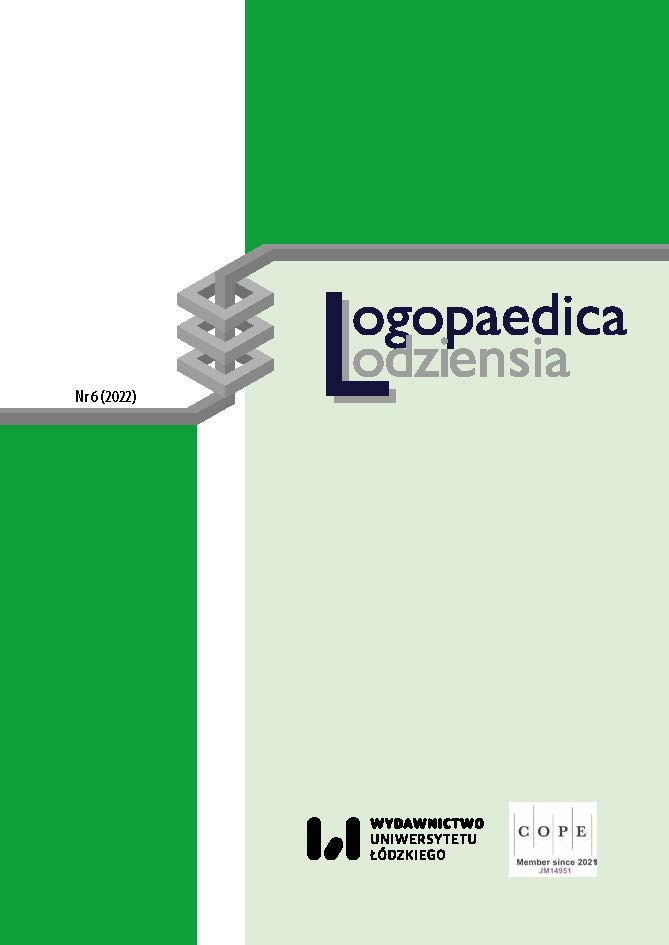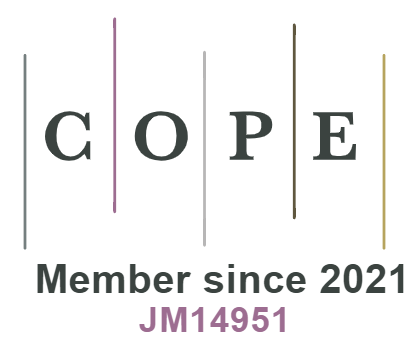Client’s Perspective in Cluttering
DOI:
https://doi.org/10.18778/2544-7238.06.08Keywords:
Speech‑Language Therapy, Evidence‑Based Practice (EBP), client’s perspective, clutteringAbstract
In a speech disorder like cluttering, we need to consider the client’s perspective. This article presents the assumptions of evidence‑based speech therapy, with particular emphasis on the third pillar of Evidence Based Practice – EBP and the subjectivity of the client. The quoted statements of adult respondents to the survey are an example of considerations on the self‑awareness and meta‑consciousness of clutterers. They were confronted with speech therapy publications about six popular statements about people who clutter. Many of the popular a priori statements so far can be considered either myths about cluttering or judgments raising reasonable doubts and requiring further analysis. This indicates the need to undertake research in Poland to verify the previous statements about cluttering.
Downloads
References
Buber M., 1991, O Ja i Ty, tłum. J. Doktór, [w:] B. Baran (red.), Filozofia dialogu, Kraków: Wydawnictwo Znak, s. 37–56.
Google Scholar
Costain K., Sønsterud H., 2021, Między badaniami naukowymi a praktyką logopedyczną: w kierunku zintegrowanej terapii mowy i języka, [w:] K. Węsierska, H. Sønsterud (red.), Dialog bez barier – kompleksowa interwencja logopedyczna w jąkaniu. Wydanie polskie rozszerzone, Chorzów: Agere Aude, s. 25–63.
Google Scholar
Curlee R.F., 1996, Cluttering: Data in search of understanding, „Journal of Fluency Disorders”, No. 21, s. 367–337.
Google Scholar
DOI: https://doi.org/10.1016/S0094-730X(96)00040-X
DiLollo A., Favreau Ch., 2010, Person‑Centered Care and Speech and Language Therapy, „Seminars in Speech and Language”, No. 31(2), s. 90–97.
Google Scholar
DOI: https://doi.org/10.1055/s-0030-1252110
Eggers K., 2021, Stawanie się efektywnym logopedą specjalizującym się w zaburzeniach płynności mowy, [w:] K. Węsierska, H. Sønsterud (red.), Dialog bez barier – kompleksowa interwencja logopedyczna w jąkaniu. Wydanie polskie rozszerzone, Chorzów: Agere Aude, s. 65–83.
Google Scholar
Georgieva D., 2001, Professional awareness of cluttering: A comparative study (Part two), [w:] H.G. Bosshardt, J.S. Yaruss, H.F.M. Peters (red.), Fluency Disorders: Theory, research, treatment and self‑help. Proceedings of the Third World Congress on Fluency Disorders in Nyborgg, Denmark, International Fluency Association, Nijmegen: Nijmegen University Press, s. 630–635.
Google Scholar
Georgieva D., 2010, Understanding cluttering: Eastern European traditions vs. Western European and North American traditions, [w:] K. Bakker, L. Raphael (red.), Proceedings of the First International Conference on Cluttering, Katarino: ICA, s. 230–243.
Google Scholar
Grabias S., 2014, Teoria zaburzeń mowy. Perspektywy badań, typologie zaburzeń, procedury postępowania logopedycznego, [w:] S. Grabias, M. Kurkowski (red.), Logopedia. Teoria zaburzeń mowy, Lublin: Wydawnictwo Uniwersytetu Marii Curie‑Skłodowskiej, s. 15–71.
Google Scholar
Hrycyna E., 2020, Aktualne problemy terapii logopedycznej w zaburzeniach należących do spektrum autyzmu – podmiotowość, celowość, metoda, „Logopedia”, t. 49(2), s. 23–37.
Google Scholar
Kaźmierczak M., 2016, Dialogiczna relacja logopedy i pacjenta, [w:] I. Jaros, R. Gliwa (red.), Problemy badawcze i diagnostyczne w logopedii, Łódź: Wydawnictwo Uniwersytetu Łódzkiego, s. 9–17.
Google Scholar
DOI: https://doi.org/10.18778/8088-476-2.02
Kaźmierczak M., 2018, Binarna i ternarna relacja uczestników procesu diagnostyczno‑terapeutycznego w logopedii, „Interdyscyplinarne Konteksty Pedagogiki Specjalnej”, nr 20, s. 143–159.
Google Scholar
DOI: https://doi.org/10.14746/ikps.2018.20.07
Kaźmierczak M., 2022a, Co pacjent/klient może wiedzieć o giełkocie? Kilka refleksji po lekturze książki Too fast for words. How discovering that I don’t stutter but “clutter” changed my life Rutgera Wilhelma (Nijmegen: Big Time Publishers 2020, 175 ss., ISBN: 979–86–664–4439–9), „Forum Lingwistyczne”, nr 10, s. 1–6.
Google Scholar
DOI: https://doi.org/10.31261/FL.2022.10.03
Kaźmierczak M., 2022b, The cognitive power of cluttering metaphors [w druku].
Google Scholar
Kostecka W., 2006, Giełkot. Studium przypadku, Lublin: AWH Antoni Dudek.
Google Scholar
Krzeszewska P., 2020, Praktyka oparta na dowodach w postępowaniu logopedycznym, „Logopedia”, t. 49(2), s. 233–248.
Google Scholar
Kvenseth H., Sønsterud H., 2009, Exciting collaboration turns cluttering fascinating: A story told by a person who clutters and a speech and language therapist from Norway, „Perspectives on Fluency and Fluency Disorders”, Vol. 19(2), s. 67–71.
Google Scholar
DOI: https://doi.org/10.1044/ffd19.2.67
Lechta V., 2012, Mowa bezładna (niewyraźna mowa, giełkot), [w:] G. Gunia, V. Lechta (red.), Wprowadzenie do logopedii, Kraków: Oficyna Wydawnicza Impuls, s. 171–189.
Google Scholar
Lévinas E., 2002, Całość i nieskończoność. Esej o zewnętrzności, tłum. M. Kowalska, Warszawa: Wydawnictwo Naukowe PWN.
Google Scholar
McCurtin A., Murphy C., Roddam H., 2019, Moving Beyond Traditional Understandings of Evidence‑Based Practice: A Total Evidence and Knowledge Approach (TEKA) to Treatment Evaluation and Clinical Decision Making in Speech‑Language Pathology, „Seminars in Speech and Language”, Vol. 40(05), s. 370–393.
Google Scholar
DOI: https://doi.org/10.1055/s-0039-1694996
Myers F.L., 2018, Istota mowy bezładnej a interwencja logopedyczna w giełkocie, [w:] K. Węsierska, K. Gaweł (red.), Zaburzenia płynności mowy, Gdańsk: Wydawnictwo Harmonia Universalis, s. 44–63.
Google Scholar
Ostapiuk B., Wojciechowska D., Grabias S., Woźniak T., 2018, Dyskusja po dyskusji na konferencji w Chorzowie, czyli o niektórych problemach logopedii w Polsce, „Logopedia”, t. 47(1), s. 369–398.
Google Scholar
Palka S., 2003, Dialog w dydaktyce ogólnej i praktyce kształcenia, [w:] A. Karpińska (red.), Teoria i praktyka kształcenia w dialogu i perspektywie, Białystok: Wydawnictwo Trans Humana, s. 481–487.
Google Scholar
Roulstone S., 2011, Evidence, expertise, and patient preference in speech‑language pathology, „International Journal of Speech‑Language Pathology”, Vol. 13(1), s. 43–48.
Google Scholar
DOI: https://doi.org/10.3109/17549507.2010.491130
Sackett D., Rosenberg W.M., Gray J.A., Haynes R.B., Richardson W.S., 1996, Evidence based medicine: What it is and what it isn’t, „BMJ”, No. 312, s. 71–72.
Google Scholar
DOI: https://doi.org/10.1136/bmj.312.7023.71
Satterfield J.M., Spring B., Brownson R.C., Mullen E.J., Newhouse R.P., Walker B.B., Whitlock E.P., 2009, Toward a transdisciplinary model of evidence‑based practice, „The Milbank Quarterly”, No. 87, s. 368–390.
Google Scholar
DOI: https://doi.org/10.1111/j.1468-0009.2009.00561.x
Scaler Scott K., St. Louis K.O., 2009, A perspective on improving evidence and practice in cluttering, „Perspectives on Fluency and Fluency Disorders”, Vol. 19(2), s. 46–51.
Google Scholar
DOI: https://doi.org/10.1044/ffd19.2.46
Sick U., 2004, Poltern, Stuttgart: Thieme.
Google Scholar
Simonska M., Georgieva D., 2007, Professional awareness of cluttering: ten years later, https://www.researchgate.net/publication/266215883_Professional_awareness_of_cluttering_ten_years_later (dostęp: 27.05.2022).
Google Scholar
Sønsterud H., 2019, The Importance of the Working Alliance in the Treatment of Cluttering, „Perspectives”, Vol. 4(6), s. 1568–1572.
Google Scholar
DOI: https://doi.org/10.1044/2019_PERS-19-00057
St. Louis K.O., Rustin L., 1996, Professional awareness of cluttering, [w:] F. Myers, K.O. St. Louis (red.), Cluttering – a clinical perspective, San Diego: Singular, s. 23–35.
Google Scholar
St. Louis K.O., Schulte K., 2011, Defining Cluttering: The lowest common denominator, [w:] D. Ward, K. Scaler Scott (red.), Cluttering: Research, Intervention and Education, East Sussex: Psychology Press, s. 233–253.
Google Scholar
Tarkowski Z., Smul M., 1988, Giełkot, Warszawa: Wydawnictwo ZSL.
Google Scholar
Tarkowski Z., Góral‑Półrola J., Reichel I., 2017, Mowa bezładna, [w:] Z Tarkowski (red.), Patologia mowy, Gdańsk: Wydawnictwo Harmonia Universalis, s. 165–194.
Google Scholar
Vanryckeghem M., 2018, Wielowymiarowa, oparta na dowodach diagnoza prowadząca do wielopłaszczyznowej terapii jąkania, [w:] K. Węsierska, K. Gaweł (red.), Zaburzenia płynności mowy, Gdańsk: Wydawnictwo Harmonia Universalis, s. 30–43.
Google Scholar
Van Zaalen Y., Reichel I., 2015, Cluttering. Current Views on Its Nature, Diagnosis, and Treatment, Bloomington: iUniverse.
Google Scholar
Węsierska K., 2015, Logopeda jako specjalista w dziedzinie zaburzeń płynności mowy, [w:] taż (red.), Zaburzenia płynności mowy, t. 1, Niezdrowice–Katowice: Wydawnictwo Komlogo, Uniwersytet Śląski, s. 101–113.
Google Scholar
Węsierska M., St. Louis K.O., 2018, Postawy polskich i angielskich studentów logopedii wobec giełkotu i osób zmagających się z tym zaburzeniem, [w:] K. Węsierska, K. Gaweł (red.), Zaburzenia płynności mowy, Gdańsk: Wydawnictwo Harmonia Universalis, s. 142–155.
Google Scholar
Węsierska K., Myszka A., Płusajska‑Otto A., St. Louis K.O., 2015, Osoby z giełkotem w społeczeństwie – diagnostyka, świadomość społeczna, postulaty, [w:] K. Węsierska (red.), Zaburzenia płynności mowy, t. 1, Niezdrowice–Katowice: Wydawnictwo Komlogo, Uniwersytet Śląski, s. 251–264.
Google Scholar
Węsierska K., St. Louis K., Wesierska M., Porwoł I., 2021, Changing Polish university students’ attitudes toward cluttering, „Journal of Fluency Disorders”, No. 67, s. 1–16.
Google Scholar
DOI: https://doi.org/10.1016/j.jfludis.2021.105828
Wielki słownik języka polskiego PAN, b.d., https://wsjp.pl/ (dostęp: 9.02.2022).
Google Scholar
Wilhelm R., 2020, Too fast for words: How discovering that I don’t stutter but clutter changed my life, Nijmegen: Big Time Publishers.
Google Scholar
Woźniak T., 2018, Zaburzenia płynności mowy – stan badań i praktyki logopedycznej na początku XXI wieku, „Logopedia”, t. 47(1), s. 141–156.
Google Scholar
Downloads
Published
How to Cite
Issue
Section
License

This work is licensed under a Creative Commons Attribution-NonCommercial-NoDerivatives 4.0 International License.












